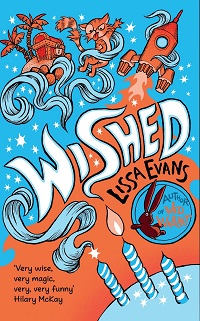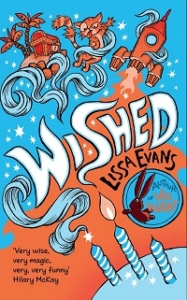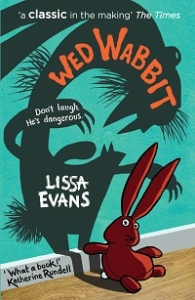
Wishing Well. An Interview with Lissa Evans
Michelle Pauli talks to Lissa Evans about her new book, Wished.
 ‘I wanted to know what a generation raised on instant magic on screens would do with wishes,’ says Lissa Evans of Wished, her fourth book for children.
‘I wanted to know what a generation raised on instant magic on screens would do with wishes,’ says Lissa Evans of Wished, her fourth book for children.
It follows three children – 10-year-old Ed, his nine-year-old sister Roo and their new friend Willard – who are forced to spend the half-term holidays with a neighbour, Miss Filey. She is ‘very, very old’ (actually in her mid-60s) thinks ‘wifi’ is a type of biscuit and lives in a time warp bungalow with a smelly, cantankerous old cat, Attlee, and a fridge-sized TV that takes minutes to ‘warm up’ enough to show its two black and white channels. Prospects for fun look remote. Until, that is, the trio discover a small tin of magical birthday cake candles.
‘I write the kind of books I loved reading at that age,’ explains Evans. ‘I very much write for the nine-year-old me, a child who had recently moved house. I hated where I was living, but I was five minutes away from a library for the first time in my life. So I installed myself in Lichfield library and read everything. I particularly loved books about ordinary children stumbling across magic. The books I reread always had some element of escapism that took me out of the life I was in.’
The escapism in Wished is provided by the brilliant conceit of a series of four-minute-long adventures inspired by a list Miss Filey had  written in the back of a childhood book, Adventure Stories for Girls. These are truly fabulous, ranging from travelling to outer space in a rocket to unexpectedly appearing in a film and catching a major international criminal.
written in the back of a childhood book, Adventure Stories for Girls. These are truly fabulous, ranging from travelling to outer space in a rocket to unexpectedly appearing in a film and catching a major international criminal.
There are flashes of Five Children and It, particularly in a couple of the earlier wishes, but Wished is very much its own book. As you’d expect from a Lissa Evans novel, it’s shot through with humour, whether in the form of Ed’s sarcasm, Willard’s more slapstick and often unwitting comedy and, unusually, Attlee’s cynical asides (yes, he finds he can talk).
‘Atlee has no obvious charm at all,’ says Evans, laughing. Despite this, he’s a total scene stealer with a voice Evans describes as ‘a combination of Kenneth Williams and Eeyore’. Though, she also muses, ‘when I was reading it for audio book, I was trying to channel Simon Russell Beale for him…’
There’s also humour in the sheer ridiculousness of the adventure stories she pastiches, full of jolly capable girls called Veronica and Belinda. Marvellously, Belinda is given the chance to go to Jupiter with the American space mission as the school prize (instead of the usual silver cup) for being terribly good at sums – and so Ed, Roo and Willard follow in her footsteps.
But while the magic and the humour make Wished pure laugh-out-loud delight, it is the children who are at the heart of the novel and give it its wonderful warmth. As in her first two children’s books, Small Change for Stuart and Big Change for Stuart, Evans draws on her experience of change at that age to bring out the different ways children adapt to new situations.
Smart, sarcastic Ed is a relatively recent wheelchair user, due to an unnamed progressive muscle wasting disease, and struggles with the visibility it has forced on him. He suffers particularly from the sense that he is ‘public property’ after the local fundraising campaign his parents have had to run in order to pay for building work to make the house wheelchair accessible. Meanwhile, his gentle sister Roo, who worries about him enormously, grows in confidence through the course of the adventures as Evans tackles, with a light touch, the complexity of a sibling relationship with a disabled person in the family.
Evans has a particular soft spot for Willard who, like her at that age, finds himself in a new place, trying to make new friends. ‘It’s a big, big thing for a child, going somewhere new and learning to cope, and Willard copes by fitting himself into an existing niche – there’s always a place for a class clown. I automatically moved into class swot territory and it made me think about roles in schools and how, once you are in a role, it’s very difficult to move out of it,’ explains Evans.
Her own ‘class swot’ niche led to science A levels and medical school at Newcastle University where she qualified, worked as a junior doctor and ‘was scared all the time, every single second, every single shift’. One day, on a train, she had ‘the epiphany of my life’ and realised she could just give it up. A short stint as a stand-up was swiftly followed by a successful career in radio and TV comedy production, including directing series such as Father Ted and Have I Got News for You. Her writing career began in 2003 with the publication of her first adult novel, Spencer’s List, and includes an acclaimed trilogy of wartime novels, Crooked Heart, Old Baggage and V for Victory.
 But it is her middle grade children’s books – the Stuart books, Wed Wabbit and now Wished – where she revels in the joy of upending reality and weaving magic.
But it is her middle grade children’s books – the Stuart books, Wed Wabbit and now Wished – where she revels in the joy of upending reality and weaving magic.
‘It does feel different. I once made some remark about writing adult books in the morning and children’s books in the afternoon, which made me sound like Margaret Thatcher – “I waste not a second of the day!” But all I meant was it does feel like I’m using a different part of my brain. If I’ve been struggling all morning with a scene in an adult book, starting a children’s book feels lighter, faster. Children feel the same emotions as adults but I don’t think they brood about them so much. There are fewer interior monologues. They get on with stuff,’ she says, approvingly.
Michelle Pauli is a freelance writer and editor specialising in books and education. She created and edited the Guardian children’s books site.
Wished is published by David Fickling Books, 978-1788452021, £12.99 hbk





